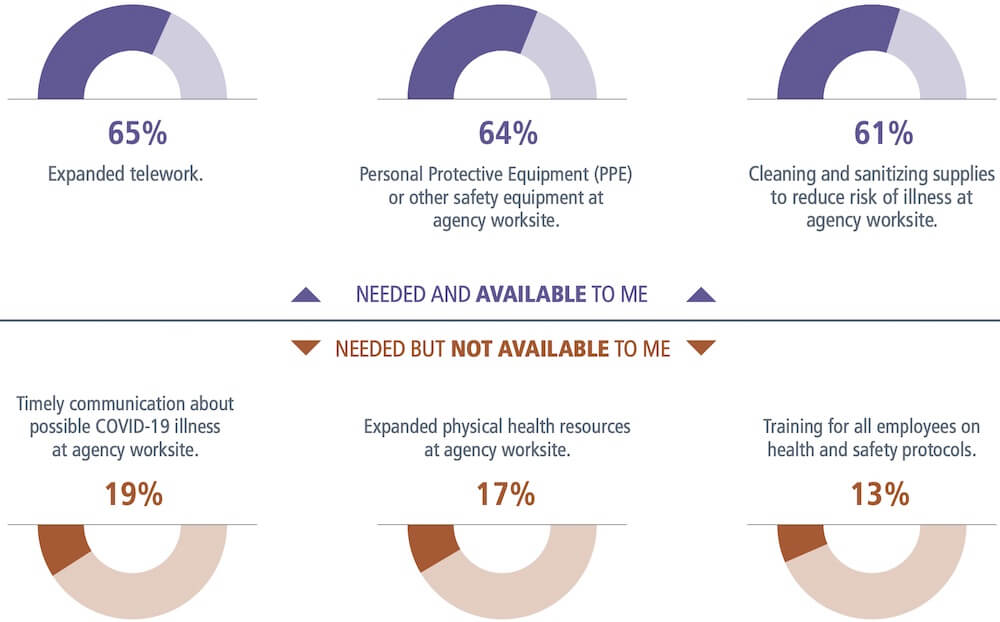The Office of Personnel Management (OPM) has published the results from the 2020 Federal Employee Viewpoint Survey (FEVS). Overall, the responses indicate that federal employees feel the work they do is important and that, despite the pandemic, work continued to get done at their agencies.
COVID and its Impact on the Federal Workforce
Unlike past surveys, the 2020 FEVS asked a number of questions to take an in-depth look at COVID-19 and its impact on federal employees.
Some of the results were not surprising. For instance, telecommuting was way up in 2020 among the federal workforce. 59% of employees teleworked every work day during the peak of the pandemic compared to 3% who teleworked every work day before the pandemic. Only 17% of respondents said they were physically present at their worksites 100% of the time during the COVID pandemic.
Another question provided more insight into the amount of leave and types of leave that federal employees used during the pandemic:
| What type(s) of leave have you used because of the pandemic? (Mark all that apply) | 2020 Percentages |
| Leave under the Emergency Paid Sick Leave Act (part of the Families First Coronavirus Response Act) | 3 |
| Annual Leave | 37 |
| Sick Leave | 30 |
| Weather and Safety Leave | 10 |
| Administrative leave | 9 |
| Other paid leave (e.g., comp time, credit hours) | 10 |
| Unpaid leave (e.g., LWOP) | 1 |
| I have not used leave because of the pandemic | 49 |
Despite the disruptions from COVID, a significant number of federal employees said that their agencies were responsive to their needs to ensure they could get their jobs done. For example, 65% of the respondents indicated that expanded telework options were needed and available to them; 64% said the same for personal protective equipment.
Additionally, responses indicated that federal employees thought that their agencies were generally meeting customers needs during the pandemic. While it had a negative impact, the responses do not indicate that the mission was greatly suffering due to COVID.
COVID-19 Work Effects
| My Work Unit… | Prior to COVID-19 | During COVID-19 | Difference |
| …met / has met the needs of our customers. | 94% | 86% | -8% |
| …contributed / has contributed positively to my agency’s performance. | 94% | 88% | -6% |
| …produced / has produced high-quality work. | 93% | 87% | -6% |
| …adapted / has adapted to changing priorities. | 90% | 87% | -3% |
| …successfully / has successfully collaborated. | 87% | 82% | -5% |
| …achieved / has achieved our goals. | 92% | 86% | -6% |
Satisfaction with Pay
How satisfied are federal employees with their pay? According to the 2020 FEVS results, the overall satisfaction levels among respondents are the highest they have been since 2016. The response data on pay specifically breaks down as follows:
| 2016 | 2017 | 2018 | 2019 | 2020 | |
| Considering everything, how satisfied are you with your pay? | 58 | 61 | 63 | 63 | 67 |
Areas for Improvement
What were the lowest rated areas?
The 2020 FEVS results show these questions as the lowest levels of agreement among respondents:
- 42% – In my work unit, steps are taken to deal with a poor performer who cannot or will not improve.
- 43% – I believe the results of this survey will be used to make my agency a better place to work.
- 51% – In my work unit, differences in performance are recognized in a meaningful way.
- 51% – In my organization, senior leaders generate high levels of motivation and commitment in the workforce. (Q. 26)
A deeper dive into the results regarding poor performers indicates that federal employees who were surveyed think that agencies could do a better job at addressing poor performers:
Additionally, respondents indicated that they remain skeptical that the survey results will be used to improve conditions at agency workplaces. Just 43% indicated they agreed with the statement “I believe the results of this survey will be used to make my agency a better place to work.” However, this was the highest level on this question since 2016.
The complete 2020 FEVS results are available on the OPM FEVS website, and a copy of the 2020 summary document is included below.




